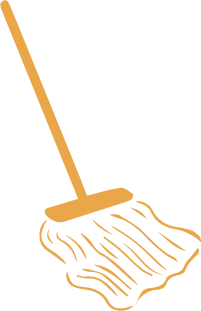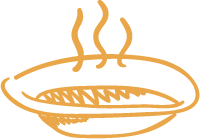Have you visited Smangus before? How did you imagine Smangus to be?
 have never visited Smangus before, but I have visited Cinsbu on the other side. I saw on Public Television Service the joint operation system applied here, and I found this solidarity fantastic. We have been considering the accommodation and tourism industry in our community in the last few years, and this system has been proposed as well.
have never visited Smangus before, but I have visited Cinsbu on the other side. I saw on Public Television Service the joint operation system applied here, and I found this solidarity fantastic. We have been considering the accommodation and tourism industry in our community in the last few years, and this system has been proposed as well.
You took part in the housekeeping work today, and you were all over the place with setting the amenities but very smooth at cleaning the bathroom, why was that?
 It probably had something to do with our nature, the Rukai people love to mop and wipe down. I used to watch my mom clean all the time and didn't think twice about it, until one day, my non-Rukai friend said, "you Rukai people are always cleaning," that's when I realized we seemed to really love to clean. My mom said that in their community, they would clean even the outside road, and sometimes they would tell people to take their shoes off before crossing the road. But sorting things neat and tidy really isn't my thing, people would refold the clothes I've already folded and was genuinely surprised when I said that I've already folded them.
It probably had something to do with our nature, the Rukai people love to mop and wipe down. I used to watch my mom clean all the time and didn't think twice about it, until one day, my non-Rukai friend said, "you Rukai people are always cleaning," that's when I realized we seemed to really love to clean. My mom said that in their community, they would clean even the outside road, and sometimes they would tell people to take their shoes off before crossing the road. But sorting things neat and tidy really isn't my thing, people would refold the clothes I've already folded and was genuinely surprised when I said that I've already folded them.
How did it feel working in the restaurant today?

I used to work the front of house in a Japanese restaurant before, so it came very naturally to me, and I knew how to talk to the customers. In the back of house, I was in charge of plating the side dishes and rice, the most difficult part was even portioning with color coordination, luckily, I pulled through in the end.
Looking at the unique Atyal dishes, I recall that we've actually discussed offering unique Paiwan-Rukai dishes in our community as well. Living close in proximity with similar cooking methods and ingredients used, the Rukai and Paiwan people often work together to provide catering services. We can include Rukai abai and Paiwan cinavu. Taro is well-loved by our people, we can dry the taro, which is smaller than our fist, and just munch on it, and there is the pigeon pea with spare rib soup, we have the habit of growing pigeon pea and make them into nutritious dishes.

Which do you prefer more, the front or back of house?
 Back of house. Front of house requires talking to the customers, sometimes the customers are very direct in their responses, and I can get affected. Back of house allows me to focus completely on my work, the tempo may be fast, and the crews are very forthcoming, but it's nothing personal and all job-related, so I won't get affected as much or be as nervous.
Back of house. Front of house requires talking to the customers, sometimes the customers are very direct in their responses, and I can get affected. Back of house allows me to focus completely on my work, the tempo may be fast, and the crews are very forthcoming, but it's nothing personal and all job-related, so I won't get affected as much or be as nervous.
What do you find most impressive after participating in the housekeeping and restaurant shifts throughout the day?

In the morning, I felt like there were so many rooms to clean that they would never end, but it feels very different compared to that tiresome feeling of working in the city. Here, everybody works together and that makes me feel happier. What I find most impressive is the shift rotation, it is quite amazing. This means that people place great trust in their teamwork and that everyone can complete their job in their position as well as help one another, showing incredible solidarity. I think this is some amazing management experience we can share with the western countries.
Another benefit is the vast number of stars in the sky. I recall how we used to say that the stars are like dandruff when we see so many of them and so close in our old community.

What touched you when you were talking with the traditional leader tonight?

I think it was when the traditional leader shared words of encouragement with me towards the end. I used to do field research in indigenous communities, and I talk to elders all the time, they usually end the conversation with, "you are an indigenous child, it's up to your generation now." Maybe it's because of the small indigenous population in Taiwan, elders bear the same hope and love for the younger generation regardless of which group we belong to, and it always touches my heart when I hear this.
There is always the issue of age, most of the time, we feel that just because we are younger, we don't get a say, and can only focus on our duty. Even if we provide our suggestions very subtly, elders still disapprove. You are only allowed opinions towards decision-making if you work extra hard and do much more than required. This happens a lot to indigenous youth in urban areas, so I envy the Smangus, they are all about equality here, people who make decisions are young, and the elders trust them, which in turn appeals to more of the younger generation to return and serve the community.




